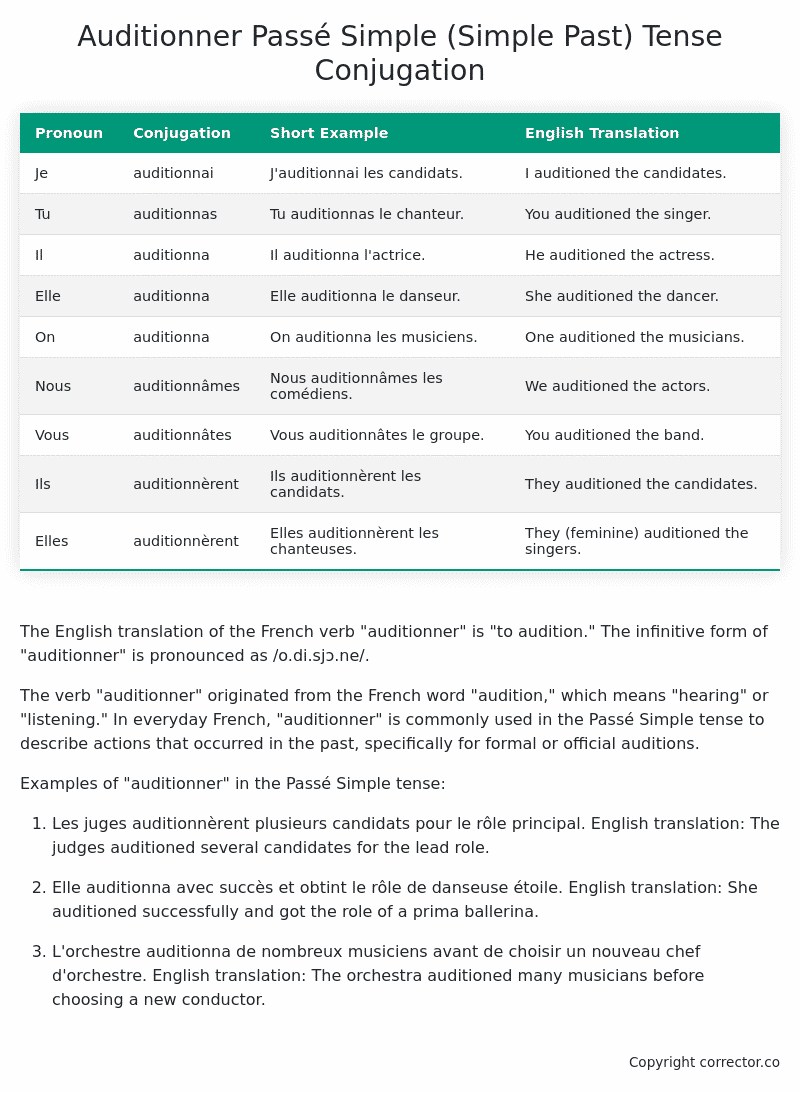Passé Simple (Simple Past) Tense Conjugation of the French Verb auditionner
Introduction to the verb auditionner
The English translation of the French verb “auditionner” is “to audition.” The infinitive form of “auditionner” is pronounced as /o.di.sjɔ.ne/.
The verb “auditionner” originated from the French word “audition,” which means “hearing” or “listening.” In everyday French, “auditionner” is commonly used in the Passé Simple tense to describe actions that occurred in the past, specifically for formal or official auditions.
Examples of “auditionner” in the Passé Simple tense:
-
Les juges auditionnèrent plusieurs candidats pour le rôle principal.
English translation: The judges auditioned several candidates for the lead role. -
Elle auditionna avec succès et obtint le rôle de danseuse étoile.
English translation: She auditioned successfully and got the role of a prima ballerina. -
L’orchestre auditionna de nombreux musiciens avant de choisir un nouveau chef d’orchestre.
English translation: The orchestra auditioned many musicians before choosing a new conductor.
Table of the Passé Simple (Simple Past) Tense Conjugation of auditionner
| Pronoun | Conjugation | Short Example | English Translation |
|---|---|---|---|
| Je | auditionnai | J’auditionnai les candidats. | I auditioned the candidates. |
| Tu | auditionnas | Tu auditionnas le chanteur. | You auditioned the singer. |
| Il | auditionna | Il auditionna l’actrice. | He auditioned the actress. |
| Elle | auditionna | Elle auditionna le danseur. | She auditioned the dancer. |
| On | auditionna | On auditionna les musiciens. | One auditioned the musicians. |
| Nous | auditionnâmes | Nous auditionnâmes les comédiens. | We auditioned the actors. |
| Vous | auditionnâtes | Vous auditionnâtes le groupe. | You auditioned the band. |
| Ils | auditionnèrent | Ils auditionnèrent les candidats. | They auditioned the candidates. |
| Elles | auditionnèrent | Elles auditionnèrent les chanteuses. | They (feminine) auditioned the singers. |
Other Conjugations for Auditionner.
Le Present (Present Tense) Conjugation of the French Verb auditionner
Imparfait (Imperfect) Tense Conjugation of the French Verb auditionner
Passé Simple (Simple Past) Tense Conjugation of the French Verb auditionner (You’re reading it right now!)
Passé Composé (Present Perfect) Tense Conjugation of the French Verb auditionner
Futur Simple (Simple Future) Tense Conjugation of the French Verb auditionner
Futur Proche (Near Future) Tense Conjugation of the French Verb auditionner
Plus-que-parfait (Pluperfect) Tense Conjugation of the French Verb auditionner
Passé Antérieur (Past Anterior) Tense Conjugation of the French Verb auditionner
Futur Antérieur (Future Anterior) Tense Conjugation of the French Verb auditionner
Subjonctif Présent (Subjunctive Present) Tense Conjugation of the French Verb auditionner
Subjonctif Passé (Subjunctive Past) Tense Conjugation of the French Verb auditionner
Subjonctif Imparfait (Subjunctive Imperfect) Tense Conjugation of the French Verb auditionner
Conditionnel Présent (Conditional Present) Tense Conjugation of the French Verb auditionner
Conditionnel Passé (Conditional Past) Tense Conjugation of the French Verb auditionner
Conditionnel Passé II (Conditional Past II) Tense Conjugation of the French Verb auditionner
L’impératif Présent (Imperative Present) Tense Conjugation of the French Verb auditionner
L’impératif Passé (Imperative Past) Tense Conjugation of the French Verb auditionner
L’infinitif Présent (Infinitive Present) Tense Conjugation of the French Verb auditionner
L’infinitif Passé (Infinitive Past) Tense Conjugation of the French Verb auditionner
Le Participe Présent (Present Participle) Tense Conjugation of the French Verb auditionner
Le Participe Passé (Past Participle) Tense Conjugation of the French Verb auditionner
Struggling with French verbs or the language in general? Why not use our free French Grammar Checker – no registration required!
Get a FREE Download Study Sheet of this Conjugation 🔥
Simply right click the image below, click “save image” and get your free reference for the auditionner Passé Simple tense conjugation!

Auditionner – About the French Passé Simple (Simple Past) Tense
Formation
Usage
Narration
Historical Context
Interactions with other tenses
Passé Composé
Imparfait
Conditional and Subjunctive
Summary
I hope you enjoyed this article on the verb auditionner. Still in a learning mood? Check out another TOTALLY random French verb conjugation!


